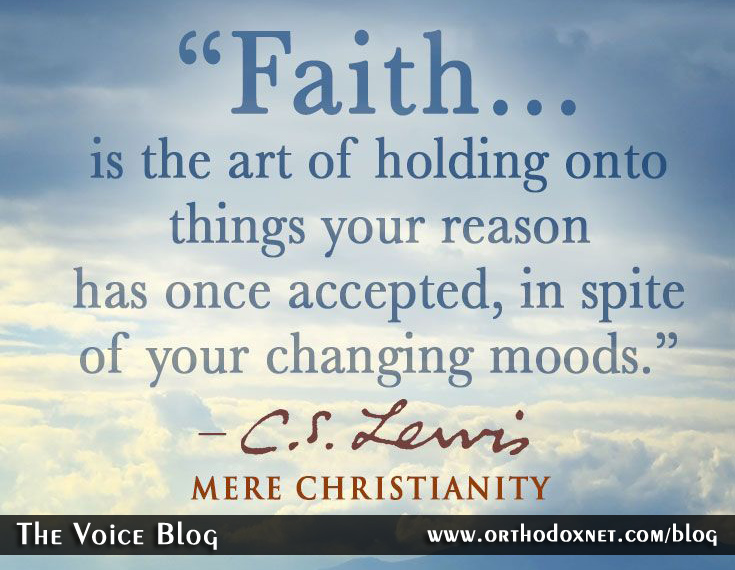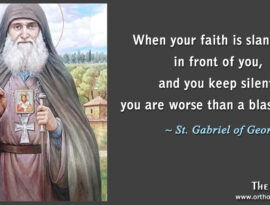 In his timeless writings C. S. Lewis cautioned us about the battle between faith and reason versus emotion and imagination that frequently rages in our hearts and minds. He wisely warned that intense emotions can destroy our faith in what we already know to be true. Lewis counseled us that teaching our moods “where they get off” was a necessary virtue of being a good Christian or even a “sound atheist.”
In his timeless writings C. S. Lewis cautioned us about the battle between faith and reason versus emotion and imagination that frequently rages in our hearts and minds. He wisely warned that intense emotions can destroy our faith in what we already know to be true. Lewis counseled us that teaching our moods “where they get off” was a necessary virtue of being a good Christian or even a “sound atheist.”
In our progressive mainstream culture where rampant emotionalism and subjective feelings have been substituted for reason, logic, and common sense, his wisdom is more relevant and applicable than ever.
Key Points:
- Battle is between faith and reason on one side and emotion and imagination on the other.
- Emotions can destroy your faith in what you really know to be true.
- Faith… is the art of holding on to things your reason has once accepted, in spite of your changing moods.
- For moods will change, whatever view your reason takes.
- Necessary virtue: unless you teach your moods “where they get off,” you can never be either a sound Christian or even a sound atheist.
- We have to be continually reminded of what we believe.
![]()
Battle is between faith and reason on one side and emotion and imagination on the other
“I was assuming that if the human mind once accepts a thing as true it will automatically go on regarding it as true, until some real reason for reconsidering it turns up. In fact, I was assuming that the human mind is completely ruled by reason. But that is not so.
For example, my reason is perfectly convinced by good evidence that anesthetics do not smother me and that properly trained surgeons do not start operating until I am unconscious. But that does not alter the fact that when they have me down on the table and clap their horrible mask over my face, a mere childish panic begins inside me. I start thinking I am going to choke, and I am afraid they will start cutting me up before I am properly under. In other words, I lose my faith in anesthetics.
It is not reason that is taking away my faith: on the contrary, my faith is based on reason. It is my imagination and emotions. The battle is between faith and reason on one side and emotion and imagination on the other.
When you think of it you will see lots of instances of this. A man knows, on perfectly good evidence, that a pretty girl of his acquaintance is a liar and cannot keep a secret and ought not to be trusted; but when he finds himself with her his mind loses its faith in that bit of knowledge and he starts thinking, “Perhaps she’ll be different this time,” and once more makes a fool of himself and tells her something he ought not to have told her. His senses and emotions have destroyed his faith in what he really knows to be true.
Or take a boy learning to swim. His reason knows perfectly well that an unsupported human body will not necessarily sink in water: he has seen dozens of people float and swim. But the whole question is whether he will be able to go on believing this when the instructor takes away his hand and leaves him unsupported in the water-or whether he will suddenly cease to believe it and get in a fright and go down.
Now just the same thing happens about Christianity. I am not asking anyone to accept Christianity if his best reasoning tells him that the weight of the evidence is against it. That is not the point at which Faith comes in. But supposing a man’s reason once decides that the weight of the evidence is for it. I can tell that man what is going to happen to him in the next few weeks. There will come a moment when there is bad news, or he is in trouble, or is living among a lot of other people who do not believe it, and all at once his emotions will rise up and carry out a sort of blitz on his belief.
moods will change, whatever view your reason takes
Or else there will come a moment when he wants a woman, or wants to tell a lie, or feels very pleased with himself, or sees a chance of making a little money in some way that is not perfectly fair: some moment, in fact, at which it would be very convenient if Christianity were not true. And once again his wishes and desires will carry out a blitz. I am not talking of moments at which any real new reasons against Christianity turn up. Those have to be faced and that is a different matter. I am talking about moments where a mere mood rises up against it.
Now Faith, in the sense in which I am here using the word, is the art of holding on to things your reason has once accepted, in spite of your changing moods. For moods will change, whatever view your reason takes.
I know that by experience. Now that I am a Christian I do have moods in which the whole thing looks very improbable: but when I was an atheist I had moods in which Christianity looked terribly probable. This rebellion of your moods against your real self is going to come anyway.
That is why Faith is such a necessary virtue: unless you teach your moods “where they get off,” you can never be either a sound Christian or even a sound atheist, but just a creature dithering to and fro, with its beliefs really dependent on the weather and the state of its digestion. Consequently one must train the habit of Faith.
We have to be continually reminded of what we believe.
The first step is to recognise the fact that your moods change. The next is to make sure that, if you have once accepted Christianity, then some of its main doctrines shall be deliberately held before your mind for some time every day. That is why daily prayers and religious reading and church going are necessary parts of the Christian life. We have to be continually reminded of what we believe. Neither this belief nor any other will automatically remain alive in the mind. It must be fed.
And as a matter of fact, if you examined a hundred people who had lost their faith in Christianity, I wonder how many of them would turn out to have been reasoned out of it by honest argument? Do not most people simply drift away?” ~ C. S. Lewis
—————————————————
Excerpts from the book “Mere Christianity” by C. S. Lewis. Emphasis of key words and phrases, and organizational edits—broke up larger paragraphs into smaller ones—to optimize readability made by Chris Banescu.





I woke up with the thought that emotions are destroying faith. Truth cannot be altered, and God’s a Word is truth. John 17:17. Proverbs 3:5-6 teaches us to lean NOT to our own understanding.
There’s a book entitled “God said, but I think”. All of these statements prove one thing…we must listen to the Word of God apart from our emotions if we are to have faith. Romans 10:17 states that faith comes from hearing, and hearing from the Word of God, not emotions. Our thinking must be converted to faith, and that can only happen when we believe (trust) the Holy Word, not emotions.